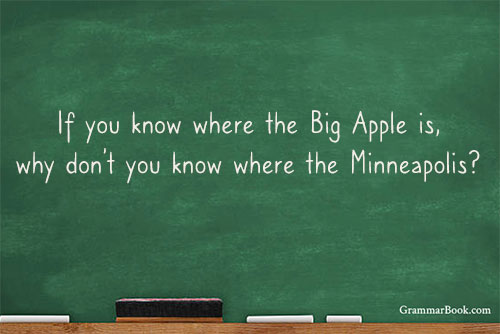|
English verbs are simple to work with when they are regular—i.e., they follow an obvious pattern for conjugating their past tense and past participle.
| Verb Infinitive |
Present Tense |
Past Tense |
Past Participle |
| to breathe |
breathe, breathes |
breathed |
breathed |
| to dine |
dine, dines |
dined |
dined |
| to jump |
jump, jumps |
jumped |
jumped |
The pattern is basic and easy to recognize. However, English also includes many verbs that set their own patterns, sometimes without apparent reason. We refer to these as irregular verbs.
| Verb Infinitive |
Present Tense |
Past Tense |
Past Participle |
| to draw |
draw, draws |
drew |
drawn |
| to lie |
lie, lies |
lay |
lain |
| to swim |
swim, swims |
swam |
swum |
As we see, irregular verbs have distinct conjugations that often provide little assistance in understanding how to conjugate other irregular verbs. We simply learn and remember them.
Another irregular verb is begin, which in its infinitive form means "to start; originate, arise; come into existence; proceed to perform the first or earliest part of some action."
Here's how we would conjugate begin as an irregular verb:
| Verb Infinitive |
Present Tense |
Past Tense |
Past Participle |
| to begin |
begin, begins |
began |
begun |
Begin
The present tense of begin is either begin or begins depending on whether it is being used in the first, second, or third person.
| first person singular |
I begin |
|
first person plural |
we begin |
| second person singular |
you begin |
|
second person plural |
you begin |
| third person singular |
he/she/it begins |
|
third person plural |
they begin |
Examples
I begin my night class on Wednesday.
Scott begins soccer practice at 4:00 p.m.
They usually begin serving dessert right after supper. |
What Is the Difference Between Began and Begun? Began
The past tense of begin is began for the first, second, and third person singular and plural.
| first person singular |
I began |
|
first person plural |
we began |
| second person singular |
you began |
|
second person plural |
you began |
| third person singular |
he/she/it began |
|
third person plural |
they began |
Examples
I'm sure the paint on the boat began peeling last summer.
It began to rain while I was locked out of the house.
We began our drive to Arkansas this morning. |
What Is the Difference Between Began and Begun? Begun
The past participle of begin is begun for the first, second, and third person singular and plural. It is commonly used in perfect tenses (e.g., past perfect) and the passive voice.
| first person singular |
I had begun |
|
first person plural |
we had begun |
| second person singular |
you had begun |
|
second person plural |
you had begun |
| third person singular |
he/she/it had begun |
|
third person plural |
they had begun |
Examples
Shane had begun playing piano before he turned seven years old. (past perfect)
The sun has begun to set over the sea. (present perfect)
The document research was begun by Loretta's paralegal. (passive voice) |
Related Topics
Ring vs. Rang vs. Rung
Why Irregular Verbs Are Strong
|
View and comment on this
article on our website.
|
|
|

|
Pop Quiz
Complete each sentence with the proper form of begin (begin/begins, began, begun).
1. The opening ceremonies for the competition have _______.
2. We _______ learning as soon as we recognize how little we know.
3. Patricia _________ preschool tomorrow.
4. The construction for the new civic center was ________ last month.
5. The parade ________ before I could get there on time.
|
 |
The Blue Book of Grammar and Punctuation
by Lester Kaufman and Jane Straus |
The Authority on English Grammar! Twelfth Edition Now Available
An indispensable tool for busy professionals, teachers, students, homeschool families, editors, writers, and proofreaders.
Available in print AND as an e-Book! Over 2,000 copies are purchased every month!
To order the book, simply click the link to order the book from the GrammarBook.com website.
|
Get Even More Useful Grammar Tips
In addition to our weekly newsletter, we post new entries about American English grammar. The following is our most recent article. Bookmark our GrammarBook blog and be sure to check it often.
What Is the Plural of Scarf?
|
Free BONUS Quiz for You!
[[firstname]], because you are a subscriber to the newsletter, you get access to one of the Subscribers-Only Quizzes. Click here to take a Good vs. Well Quiz and get your scores and explanations instantly!
We will be adding many more quizzes this year to our already substantial list of them. If you have suggestions for topics we have not yet covered, please send us a message at help@grammarbook.com.
|
Hundreds of Additional Quizzes
at Your Fingertips
Subscribe now to receive hundreds of additional English usage quizzes not found anywhere else!
Teachers and Employers
Save hours of valuable time! You may assign quizzes to your students and employees and have their scores tallied, organized, and reported to you! Let GrammarBook.com take the hassle out of teaching English!
"Fun to test my skills."
"The explanations really help ... thanks!"
"I can select the quizzes to assign to my students, and then the results are reported to me automatically!"
99¢
QUIZZES
|
Don't need all the quizzes?
You can now purchase the same quizzes individually for ONLY 99¢ each.
Purchase yours here.
|
If you think you have found an error in a quiz, please email us at help@grammarbook.com
|
Wordplay

Pop Quiz Answers
1. The opening ceremonies for the competition have begun.
2. We begin learning as soon as we recognize how little we know.
3. Patricia begins preschool tomorrow.
4. The construction for the new civic center was begun last month.
5. The parade began before I could get there on time.
|
 |
English In A Snap:
68 One-Minute English Usage Videos FREE |
Learn all about who and whom, affect and effect, subjects and verbs, adjectives and adverbs, commas, semicolons, quotation marks, and much more by just sitting back and enjoying these easy-to-follow lessons. Share them with your colleagues (and boss), children, teachers, and friends as well! Click here to watch.
|
|





